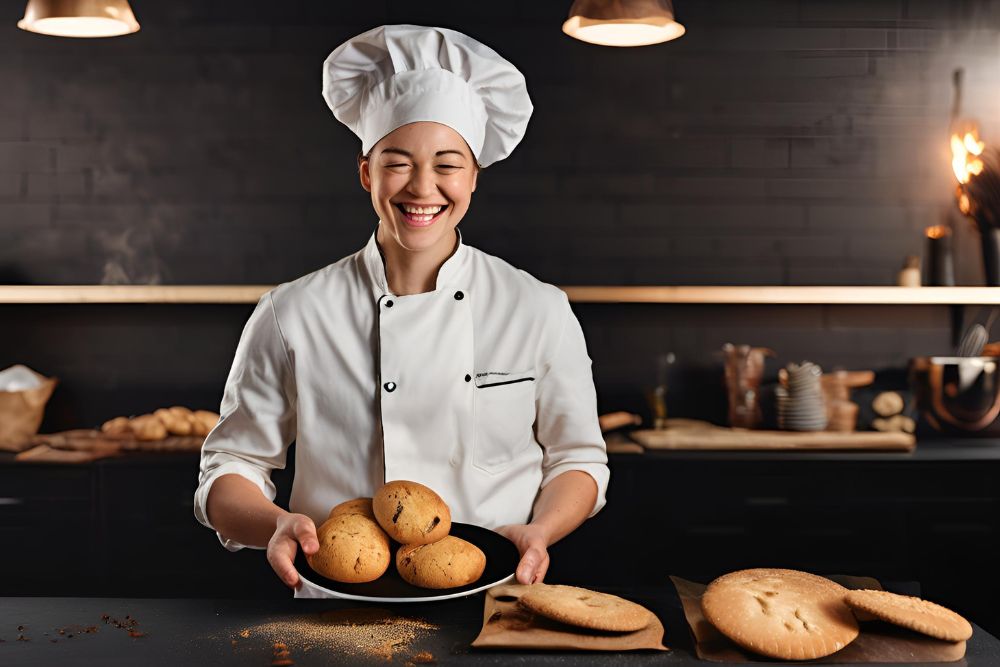Pros and Cons of Baking
Baking has long been a beloved activity, whether as a professional career, a creative hobby, or a family tradition. From baking bread to crafting elaborate cakes, it offers endless opportunities to create something delicious and beautiful.
However, like any other pursuit, baking has its own set of advantages and challenges. In this article, we explore the pros and cons of baking to help you decide if this culinary art is right for you.
|
|
Pros of Baking
1. Creative Expression
Baking is a fantastic way to express your creativity. From designing intricate cake decorations to experimenting with unique flavor combinations, baking allows you to craft something that is both visually appealing and delicious. It’s an art form where your imagination is the only limit.
2. Therapeutic and Relaxing
For many, baking is a stress reliever. The process of measuring ingredients, kneading dough, or decorating cookies can have a calming effect. It allows you to focus on the task at hand and forget about the stresses of daily life, making it a therapeutic hobby.
3. Rewarding Results
One of the most satisfying aspects of baking is enjoying the fruits of your labor. Whether it’s a warm loaf of bread or a decadent dessert, seeing (and tasting) your creations can be incredibly rewarding.
4. A Great Way to Bond
Baking is a wonderful activity to share with family and friends. Whether you’re baking cookies with your kids or hosting a bake-off with friends, it fosters connection and creates lasting memories.
5. Learning and Skill Development
Baking teaches valuable skills such as precision, patience, and time management. As you learn new techniques and master recipes, you’ll gain confidence and satisfaction in your abilities.
6. Cost-Effective
While buying baked goods from a bakery can be expensive, baking at home can save money in the long run. You can make your favorite treats at a fraction of the cost while also controlling the quality and ingredients.
7. Opportunity for a Career or Side Business
Baking can evolve from a hobby into a profitable career or side business. With the rise of online bakeries and food delivery services, it has become easier than ever to turn your passion for baking into a source of income.
8. Healthier Alternatives
When you bake at home, you control the ingredients. This means you can opt for healthier substitutions, such as using whole-grain flours or reducing sugar content. It allows you to enjoy treats without compromising on nutrition.
9. Brings Joy to Others
Baked goods are a universal way to spread joy. Whether you’re baking for a celebration, gifting homemade treats, or simply sharing cookies with coworkers, your efforts are sure to be appreciated.
Cons of Baking
1. Time-Consuming
Baking can be a lengthy process, especially for complex recipes. From preparing ingredients to waiting for dough to rise, it requires time and patience. For those with busy schedules, this can be a significant drawback.
2. Requires Precision
Unlike cooking, where improvisation is often rewarded, baking demands precision. A small mistake, like mismeasuring an ingredient or setting the wrong oven temperature, can ruin the entire recipe. This can be frustrating, especially for beginners.
3. Mess and Cleanup
Baking can leave your kitchen in disarray. Between flour-covered countertops, sticky bowls, and dirty utensils, the cleanup process can feel overwhelming and deter some people from baking regularly.
4. Equipment Costs
While basic baking requires minimal tools, more advanced baking often calls for specialized equipment. Items like stand mixers, cake molds, and silicone mats can be expensive, making it harder for beginners to get started.
5. Caloric Temptation
Baked goods are often high in calories, sugar, and fats. If you bake frequently, the temptation to indulge can be hard to resist, which may lead to weight gain or unhealthy eating habits.
6. Ingredient Costs
While baking at home can save money, the cost of high-quality ingredients can add up. Specialty items like almond flour, premium chocolate, or organic ingredients may strain your budget.
7. Potential for Failure
Not every baking attempt will be a success, especially when trying new recipes or techniques. Failed bakes can be disheartening and may lead to wasted ingredients and time.
8. Space Requirements
Baking requires ample counter space and storage for ingredients, tools, and equipment. If you live in a small apartment or have a compact kitchen, baking can feel cramped and inconvenient.
9. Stressful in Professional Settings
For those who pursue baking professionally, the pressure can be intense. Meeting client expectations, adhering to strict deadlines, and managing a high volume of orders can lead to stress and burnout.
Conclusion
Baking is a rewarding activity that combines creativity, skill, and the joy of sharing. While it comes with challenges like time commitment, precision, and cleanup, the benefits far outweigh the drawbacks for those who love the craft.
Whether you’re baking as a hobby or pursuing it professionally, understanding the pros and cons of baking can help you embrace the journey with confidence and enthusiasm.

